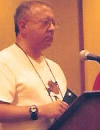Frank Scassellati's Story
 I have had a mental illness since childhood, in the early 1960s; but I
received no treatment for it due to a lack of mental health services for
children and adolescents in my area. (Such services were not created until
1974.) I suffered through a childhood of mental anguish, complicated by
ridicule from other children. I sat catatonic at my desk in school, afraid
to relate to the other children, not understanding the mental illness that
ravaged my mind.
I have had a mental illness since childhood, in the early 1960s; but I
received no treatment for it due to a lack of mental health services for
children and adolescents in my area. (Such services were not created until
1974.) I suffered through a childhood of mental anguish, complicated by
ridicule from other children. I sat catatonic at my desk in school, afraid
to relate to the other children, not understanding the mental illness that
ravaged my mind.
In high school, still without treatment, I eventually began drinking in
a desperate attempt to ease my pain. It only made things worse, increasing
my psychoses and intensifying psychotic episodes that terrified me.
I entered college in 1972, still not understanding my illness. In the
winter of 1975, my mental anguish grew so severe that I tried to commit
suicide. I ended up in the psychiatric ward of a nearby hospital, where
I was diagnosed with schizophrenia and began to receive treatment. I
finally began to understand the bizarre world of hallucinations, delusions,
paranoia, and psychotic episodes that is called schizophrenia.
I started doing research to better understand the illness; I was determined
to overcome and recover from it. This process continues to this day.
Then came a turning point: I became involved with my local chapter of
the National Alliance for the Mentally Ill (NAMI). I attended NAMI support
groups and began to go to state and national conventions, where I met
many other individuals diagnosed with mental illnesses and we shared
our experiences of recovery.
My association with NAMI led me to The Advocacy Alliance (an affiliate
of the National Mental Health Association), another wonderful organization
that helps people who have mental illnesses. I began doing volunteer
work there, and this has better enabled me to reintegrate into the community.
The wonderful staffs at both organizations have helped me a great deal.
My fiancée, whom I met at the Advocacy Alliance, has also been diagnosed
with schizophrenia; we try to help each other in our recovery, and we
have hopes for a bright future.
I still have schizophrenia but I have recovered to the point where I am
able to function within the community, and I try to pass along this hope
of recovery to others. I have become involved with my local Community Support
Program, a coalition of people with mental illnesses, family members, and
mental health professionals; and the Pennsylvania Mental Health Consumers'
Association (PMHCA), a statewide organization of people who have mental
illnesses, in order to help others like myself.
Recently, I was hired by PMHCA as Northeast Pennsylvania Coordinator for "Leadership
In Recovery" programs that will be taking place for the next three
years. I really love this job, and I am trying to apply my experiences
in recovery from mental illness to my work. I also do educational presentations
about mental illness at local colleges, facilities for children and adolescents
with mental illness, and local mental health counseling centers. These
presentations are sponsored by the Advocacy Alliance.
A diagnosis of mental illness should not be a barrier to achieving one's
goals. Anyone can recover: It just takes hard work and a willingness
to develop the coping skills necessary to overcome mental illness.
Frank Scassellati